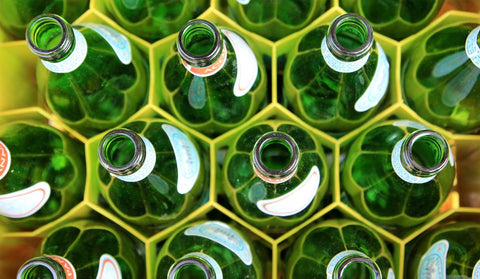RECYCLING 101: WHAT IS IT AND WHAT IS IT NOT?

Source: Unsplash | Jilbert Ebrahimi
We often forget, but our natural resources are limited. Especially, as the world population increases day by day and the consumption frenzy continues, it is of great importance that wastes that can be reused are reintroduced into the production process through various processes, thus protecting resources. Maybe you've only heard the word 'recycling' until now, maybe you already contribute to recycling processes by separating your waste at home; We believe that regardless of how much knowledge we have on this subject, we should all adopt certain points about recycling and that the sustainable world we dream of will only be possible with such awareness. So, this week's topic: recycling 101.
Let's start by defining recycling: We call recycling when materials such as paper, cardboard, glass, plastic and metal become ready for reuse as secondary raw materials after going through various physical, chemical and biochemical processes . As we mentioned above, recycling not only allows saving natural resources, but also saves energy by reducing the number of processes in production. For example, 20 metal boxes can be made using the same energy recycling method as one metal box produced by mining.

Source: Unsplash | Lacey Williams
We said that recycling ensures the protection of natural resources. Let's explain a little: For example, by recycling one ton of paper, the cutting down of 17 trees can be prevented . For every ton of glass converted, 100 liters of oil are supplied . While it is possible to protect natural areas by recycling metal and wooden packaging, recycling plastic packaging waste saves oil. Recycling a used paper reduces air pollution by 74-94%, water pollution by 35% and water use by 45%.
Think of it this way, under normal conditions , a single glass bottle remains in nature for 4000 years , and if this bottle is thrown away and reaches landfills, this period can be even longer. However, when it is possible to recycle that glass bottle, a new product emerges and the same material can be used again and again, extending its lifespan. The same goes for tin cans: Non-recycled tin cans remain in nature for approximately 500 years or more. However, when an aluminum can is recycled, it can help save enough energy to power your home television for 3 hours !
Of course, the benefits of recycling are not limited to these: Thanks to recycling, greenhouse gas emissions decrease , soil fertility increases , especially by recycling household waste by composting, which ensures that the nutritional value of the food products obtained is higher . In fact, at the end of the day, reducing the amount of waste makes leaving a more sustainable and cleaner world to future generations a more attainable goal. As the amount of waste decreases, in addition to solid waste; Liquid wastes are prevented from polluting the soil, sea, oceans and gaseous wastes from polluting the air. What more?

Source: Unsplash | Jasmin Sessler
Recycling processes are basically completed with 4 main applications : 1) Collecting recyclable waste separately so that it does not mix with normal garbage, 2) sorting it into classes according to categories such as glass, metal, plastic and paper, 3) changing chemically and physically into new materials. 4) reuse of recycled products. The good news is that you can start contributing to this nature-respecting cycle today. How Does? For example, you can start collecting the packaging waste in your home separately before it gets mixed up in the trash and throw it into recycling bins. At this point, we think it may be useful to take a look at the recycling practices of your municipality. At the same time, you can share what you know with those around you and encourage them to do the same.
Let's end with a small but important note ... Broken glass, light bulbs and fluorescent lights, cosmetic and hygienic papers such as napkins and toilet paper, pizza boxes contaminated with oil and food residue, cardboard or styrofoam plates and cups, nylon bags, stretch films, clothes hangers, ceramics. Products and packaging such as products, bottles containing chemicals such as paint, medical waste and batteries should not be thrown into recycling bins as they are materials that cannot be recycled or require some different processes for recycling .
We hope that you have acquired the basic information about recycling in this article, and we would like to inform you that we will examine the relationship between recycling and fashion in our next article. Don't forget to stay tuned!

